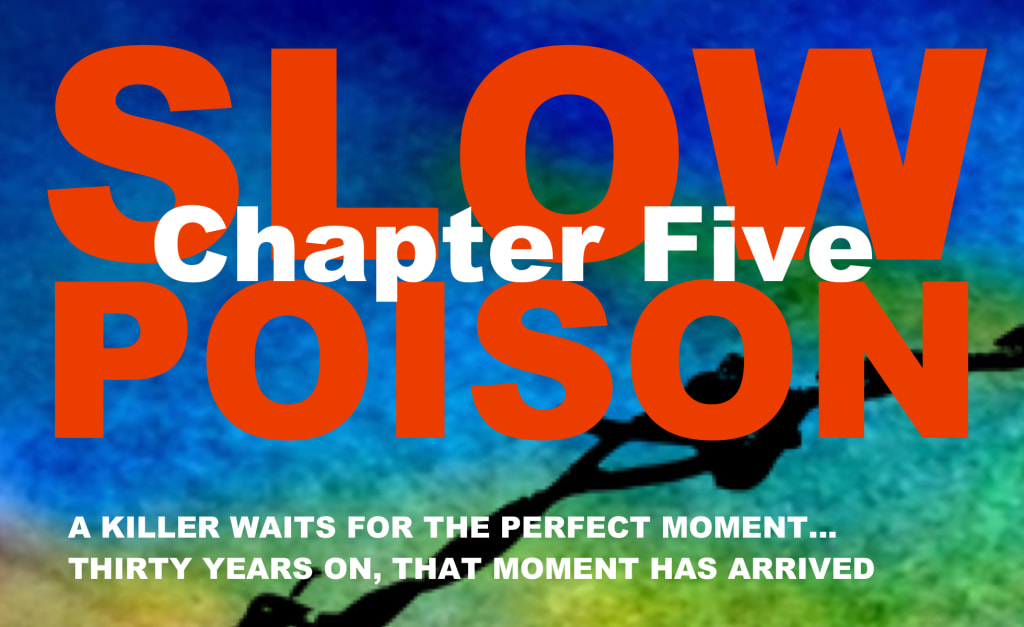Slow Poison - Chapter Five
Chapter Five

Chapter Five
Amsterdam, December 7th
Centraal Station was a lonely place at six thirty on a Sunday morning. The newspaper kiosks were not yet open. There were bundles of newspapers stacked against the aluminium security screens tied up with coloured twine. Piles of De Telegraaf, The Sunday Times, Das Welt and all the others. Trim slipped an Express from its stack and leaned back against a screen. He glanced at a few lines about the violence in Amsterdam at the bottom of the front page, before dropping the newspaper to the floor. He would wait for the Sun on Monday. The diary would suffice as reading matter for the journey.
The train for Schiphol left the station at precisely six-forty. At seven-thirty, Trim was checking his baggage through at the Danair desk. The Bristol flight was on time, the weather was clear and fine. He had an hour before take-off. He looked left and right at the security men with their high-powered rifles slung jauntily over their shoulders. Another world. He offered his passport for inspection. No stamp. No questions. No problem. Nothing. No record of his visit at all. He had used an assumed name at the cheap pension. His ticket was booked in the name of the passport holder. No problem there.
He limped through the arcade of duty free shops without stopping. He bought coffee from a stand up bar. He took it through to the waiting area near his appointed gate. No one looked up as he took a seat near a window. Dawn was breaking and the lights of the airport twinkled under the stars above. He watched with disinterest the activity on the runways outside. After twenty minutes of waiting, the security guards and the ticket handlers motioned for his group to check in. Trim tried to remember what, if anything might set the alarm bells ringing. The drugs had been mailed ahead to a newsagent in Thrupp. No problem.
His first class ticket was exchanged for a seat near an emergency exit. He turned his mind off as the stewardess ran through the safety precautions. He didn’t need to hear them. He had made it this far. He looked out of the small window as the runways and fields and motorways disappeared below. Bright sunlight from the distant curving horizon speared through the portholes. He sank back into his plush stool as the rush of speed chilled his brain. So like the high. The third line; so swift and painless.
The Danair swooped into the first of a series of banking manoeuvres and bore them out and across the channel. He pulled the diary from his briefcase, pulled the flap of the table down and rested the diary open at a familiar passage.
August 12, 1974, Stonehouse. When was the time to leave, the time to decide, the time to act? There was awareness, signs emblazoned bright and lurid for each of us, but too bright to see, to large to comprehend, to unbelievable to be believed. I see now, that even with all the lessons learned, with so much hindsight, nothing much has changed. When is Belfast abandoned, Beirut’s streets a glow over shoulders, traitor trains rolling like tears over the husks, the brittle bones? When is the time to leave?
The light of day. Sunday. No amount of prayer could alter what Becky already knew. The thoughts sickened her, woke her suicidal, frightened to face the rest of her life. Sarah. What could she tell her? Oceans of panic dragged her down to drown. Had they released his name? Would they do that? They might. The next of kin already knew. They might just blurt it out between Popeye and Sesame Street. Or just after the Archers. She had entered unknown realms.
Bristol lay grey and leaden in its dip, as grey as the asphalt runways, as grey as the metal underbelly of the plane that touched down, as grey as the grimy silt-sludge of the Avon oozing past the oil refineries. Paganini played, the second Caprice, as Trim steered the Mercedes over the arc of The Avonmouth Bridge. His mood took him toward the slower pace of the A38. He crammed jelly babies into his mouth. Sweet, cloying chemicals, bad, good. Empty energy. There was a transport café at Newport. Not far. A good place. A lean-to loo out the back with one long trough, tobacco strands and glutinous gilberts drifting down the deep gold river. He felt the blood surge into the vein and he shifted in his seat, causally smoothing the Armani.
The wooden café building was tightly hemmed in by rings and rows of articulated lorries, but there were car sized spaces near a low wall that held back a tangle of refuse and brush from the car park. A train roared under the bridge, twenty yards up the road. The lorry park stank of diesel, the smoke-filled cafe a mixture of bacon and sweat. He had a coating of stubble in common with most of the clientele. Several of the lorry drivers watched him limp to the counter, watched him order, before returning to their cracked mugs of tea and greasy sandwiches. Some of the drivers were pulling at the whirring fruit machines that lined one of the walls. Trim watched them as he stood waiting for his coffee and cheese roll. He bumped his way past the row of players, inhaling their smells, adding another wallet to his collection. He sat close to the victim. He slid the wallet to the floor, unseen. He sat back to enjoy his coffee and to wait. After a few moments of pumping and pulling, a large hand felt a back pocket, fingering denim in searching circles.
“What the fuck? OKAY, who’s the fuckin’ joker?”
Trim leaned over and picked up the wallet from the floor, meeting the startling blue eyes of the player as he looked up.
“Is this what you’re looking for?” he asked, dangling the wallet before him.
“Yeah. Cheers, mate!”
Nothing. Not this time. And off he went again, pumping more coins into the hungry slot. Trim watched him, watched his arm flex, the biceps, back muscles, the neck muscles, the grubby shirt collar. He watched him slap the side of the machine with pleasure if it deemed it time to spew out another pound or two. Trim was enjoying his own game.
Coffee and roll finished, he took the Mercedes on up the road toward Gloucester, Cheltenham, Tewkesbury; the trucker’s reclaimed wallet lying on the passenger seat, still warm. At the Slimbridge bend, he leaned over and tossed the wallet through the opening window, onto the grass verge in front of a string of shops. He slotted another disc into the player as the car crooned smoothly onward. Four Legends. Sibelius. Trim exhaled a long sigh and began the first of a series of smiles, aware from the second.
A cigarette would be perfect. Sobranie Cocktail. Lilac. Gold-tipped. So indiscreet. The delicious black tobacco brought Bournville to mind. E-lax cast the thought away. His smiles missed a beat. He slowed the car at the Swan of Tuonela and pulled into a lay-by to savour the majesty of the sounds and scents that filled the car. Lenny could wait.
The police station in the Warmoesstraat.
Den had slept well. The cell was more comfortable than the Sleep-in and breakfast had been the best thing he’d eaten in years. He had cadged a few more cigarettes from one of the policemen and was in the process of lighting up the last one when Koning appeared at the door with the cell guard. Den assumed his arrogant pose, feet up on the grey cell blanket. Koning had given up his Sunday morning squash game for this kid. He prayed he would be co-operative.
“Mornin’ Chief!”
Koning ignored the greeting. He sat down beside Den and opened his briefcase. He began to leaf through several sheaves of paper.
“I have spoken to the public prosecutor. He agrees with me that there may be some room for doubt in the case. We may be able to arrange a reconstruction, I think. But, before that, you and the others will be formally charged with the killing of the man. Did you know him? The victim?”
“Nope. Just from the Vic.” Den said sullenly.
“I brought you these. Are they okay?” He handed Den a pack of Pall Mall.
“Yeah, cheers mate!” ‘This geezer’s all right’ he thought.
“I won’t be seeing you anymore today, but there will be the preliminary hearing tomorrow. You will most likely be transferred to the Biljmer Bajes.”
“Wos that?”
“It is a holding prison for interim cases. A bit more comfortable than in here, I think.” Koning looked despairingly around the bleak cell.
“See ya tomorrow, then. An thanks for the fags.”
“What a fool.” thought Koning.”Now for the others.”
Stonehouse, Noon.
Mister Trim and Sarah ran into the kitchen to see what the noise was. There were peeled potatoes rolling all over the kitchen floor. The portable radio lay among the peelings in the bowl, floating in the muddy water. Mrs. Trim was shaking and very pale.
“What on earth is up with you, love?”
Nothing. Lips slightly parted. Nothing.
“Come on, Sarah. Let’s pick up these taties, shall we?” he said lightly. “What the hell’s the matter, love? You look as if you’ve seen a ghost!”
“I can’t tell you here.” she whispered hoarsely. “In the lounge.”
They left Sarah happily picking up the scraped potatoes from the kitchen floor.
“Right. What’s up then?”
“On the news...they just give it out on Severnside.”
“What?”
“They said a local man was killed.”
“Who.”
“In Amsterdam. Last night.”
“Oh bloody hell.”
“They just give it out on the news. I think it’s Fred.”
The lay-by. Trim leaned forward with his arms folded on the steering wheel, his head resting on his arms. He dozed lightly. The interior of the car was warm and perfumed with Russian tobacco. The CD player offered seamless music. He stirred suddenly, aware of time. He stretched and opened the car door, letting in a frost filled slice of Gloucestershire. He swung his legs out of the car and stood up shakily. He breathed in painfully through his nose. He looked across the far fields and saw in the distance the landmark of Tyndale’s Monument. He remembered a visit as a child. He had described the trip to the old man. There had been an aura of poppies around the first of the flag steps that spiralled up toward the small chamber at the summit. He remembered the smell of the musty bible, the decayed leather binding a little like the diary. The old man had seemed interested. His eyes had shone, like they did. He had listened, had said nothing, and had nodded quietly as the story unfolded.
Trim returned to the car and removed the diary once more from his pocket. Another familiar passage.
August 17, 1939. From the steamy windows of the bus, through the simple faces you traced, I could see the cottage in the rectangle of elder, a sentinel in the unrelieved horizon that was spinning away. My last glimpse was blotted out by the sunspots that glowed, retina etched, for long moments. The cottage, a silhouette that lay beyond reach, already a memory, a rough sketch, an impression on hand-made paper, in the leather portmanteau, racked above us.
(If you've liked what you've read, please check out the rest of my work on Vocal and by clicking linktr.ee/davidirelandmusic )
About the Creator
David Philip Ireland
David Philip Ireland was born in Cheltenham in 1949
David has published work in music, novels and poetry.
To discover David’s back catalogue, visit: linktr.ee/davidirelandmusic






Comments
There are no comments for this story
Be the first to respond and start the conversation.